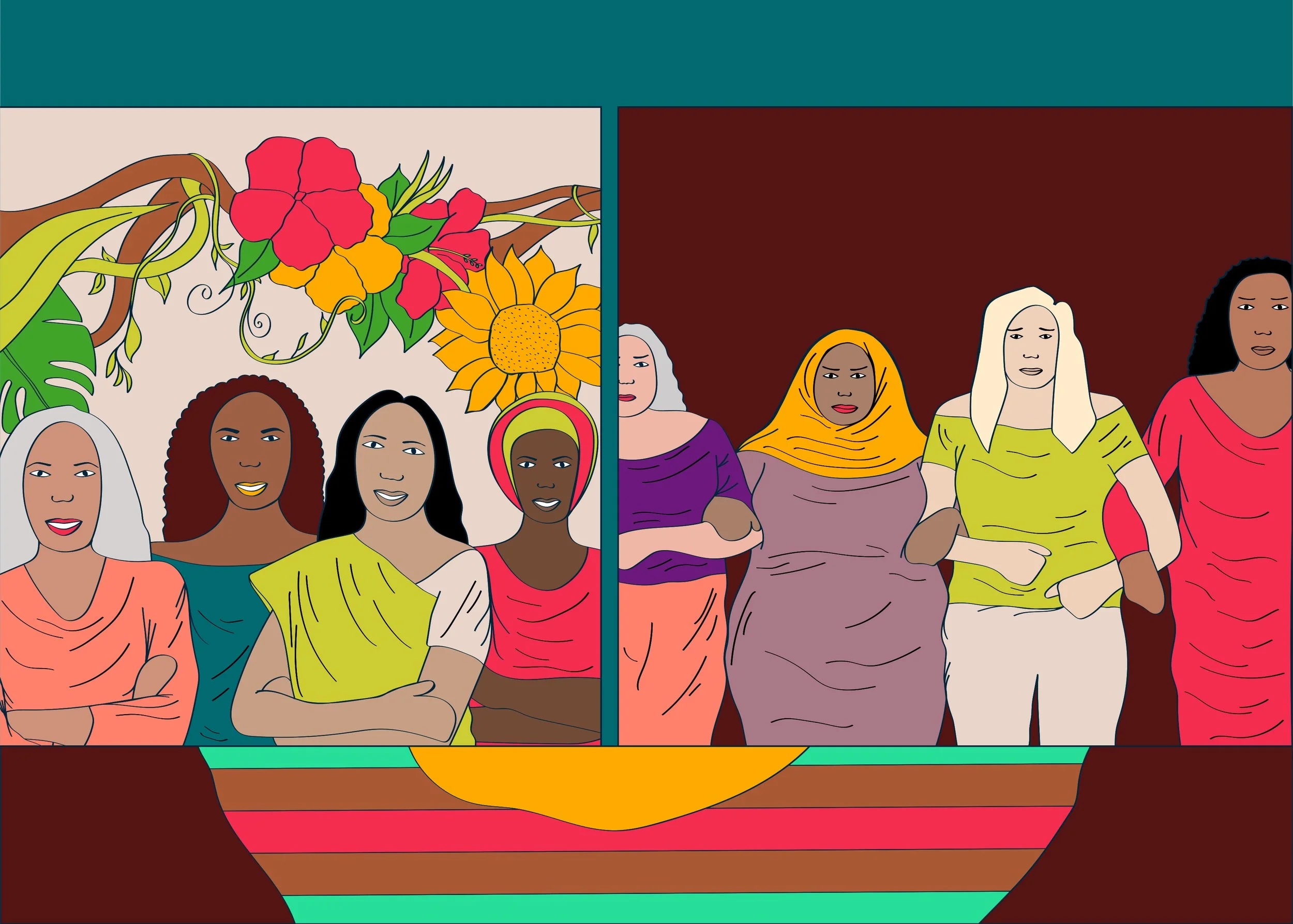LSE Centre for Women, Peace and Security - Network of Women Mediators Across the Commonwealth illustrations
For this project, I produced illustrations for the Personal Impact, Professional Resilience: The Psychosocial Implications of Peacebuilding for Women Mediators Report. The report aimed to comprehend the numerous impacts of peacebuilding work on women practitioners and identify potential psychosocial support instruments that could help women navigate and manage the personal impacts experienced.
The report is inspired by the experiences of 28 professional women mediators and peacebuilders from the Women Mediators Across the Commonwealth network - from Commonwealth countries in Africa, the Americas, Asia, the Caribbean, Europe, and the Pacific and Australasia. It provides an overview of; the personal impact of their work, their professional resiliency in the face of challenging factors, and the support mechanisms that would benefit women mediators and peacebuilders working with conflict-affected populations.
-

Work as a balancing factor
The positive aspects of working for peace and conflict transformation balance the negatives. Peacebuilding brings the women joy, happiness, confidence, trust, and a sense of accomplishment.
-

Gender as a catalyst
Women see their gender as a source of strength. Women’s unwavering belief in conflict transformation drives their professional resilience, and part of that resilience is the recognition that being a woman in the field is a helpful catalyst for their work.
-

Coping and self-care
Informal supports such as connections with family, friends, and partners to cope with the impact of their work & formal counselling to “unpack” and “offload” when work becomes “heavy.”
-

Professional resilience
Women mediators derive strength from changing lives, preventing conflict, and addressing the needs of victims. Women compartmentalise the emotions associated with what they are hearing to maintain the mental focus required to do their work.
-

Resilience from working with other women
Working with other women provides increased enthusiasm and strength, and the opportunity to come together as a community of global women for support, advice and solidarity in a non-competitive, safe, and professional space.
-

Mainstreaming Psychosocial Support
Adequate psychosocial support, including regular participation in a community of practice debriefing/support forum; formal education/training on trauma and resiliency, local support groups, expert-led group retreats, counselling, therapy or other clinical support, relaxation and stress-reducing techniques.
-

Safe Spaces and Peer Support
Self-organised support groups, storytelling circles, mentoring, peer debriefing, professional counselling, and professional reflective spaces
Reducing isolation allows women practitioners to let down the barriers that exist in their professional lives, and gain strength
Space for women to rest, reflect, share stories, gain new skills, access complimentary therapies, and receive formal therapeutic support
-

Psychoeducation and Training
Greater knowledge about how conflict-related stress and trauma can impact practitioners and conflict-affected populations
Awareness of signs of impact and knowing when to access peer or professional support
Learn more relaxation and stress-reduction techniques
Trauma-informed and resiliency-focused training embedded within working practices
-

Counselling and Therapeutic Support
Formal therapeutic support including space to process the pressures of their work, help to re-energise, and assist in coping with the stressful or mentally difficult parts of their work
Support for families as women mediators are often “working in a hostile environment[s] so [their families] feel that anything can happen to them anytime”
Counselling available by phone, virtually, and/or in person
-

Advocacy and Research
Advocacy for the psychosocial support of women mediators and peacebuilders to normalise the discussion
Recognition of the role of women mediators and peacebuilders needs to be promoted at local regional, national, and international levels
Research into themes related to the personal impact and professional resiliency of women mediators should be funded to continue
-

Prevention
Pre-deployment briefings and post-deployment debriefings that take into account psychosocial needs and impact should be offered to every women mediator and peacebuilder
Sexual harassment awareness, response, and reporting frameworks should be established within organisations working with and deploying women mediators and peacebuilders. Leaders should create a safe space for women to make complaints and ask for support
-

Financial Support
Governments and INGOs need to implement funding structures that will effectively support the work of women mediators and peacebuilders working at the local, national, regional and international levels
Funding needs to be created to generate new self-care and psychosocial support structures for women mediators and peacebuilders
I had a fantastic experience creating this project and learned so much. I worked with a supportive team that had great insights. I learned a lot from them and the project. I am honoured to have been a part of this and grateful to the LSE Centre for Women, Peace and Security team for trusting me with this undertaking.


